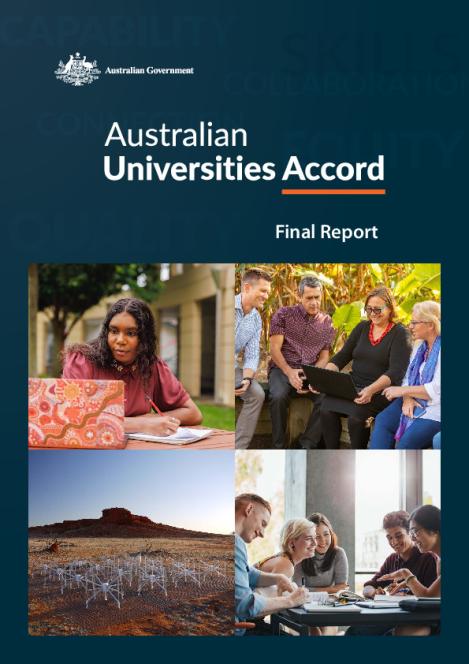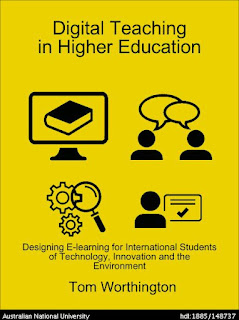 |
| Australian Universities Accord Final Report, 25 February 2024 |
Why would a student, particularly a young student, prefer to student in a remote area, which they could study in one of Australia's exciting cities? The mining industry has to provide very high salaries to attract workers. Will regional universities be prepared to offer cut price courses, or a guarantied high salary part time job to students?
More realistic are proposals from the panel to streamline visa processes. Australian universities are dependent two markets: China, and India. As I warned in 2016, a regional crisis could result in the loss of most on-campus international students. Universities need to diversify markets, and delivery methods.
The panel suggests improving alumni engagement in the region. This is certainly one way to boost links, but other more direct forms of marketing should also be used.
The recommendations on international students from the panel are excessively timid. Rather than see international students as a source of funds, and workers, it can be a way to provide a more vibrant environment for domestic students, who are preparing to be part of a global workforce. I presenting a proposal in 2018 to have students of the region working together online.
Producing new knowledge and using research capability
The panel rightly chose to put learning issues before research. With recommendation 24 the panel proposes a an examination of
national research funding. However Australian universities should have already being doping that, routinely, as part of their normal planning.
 |
| Professor Lachlan Blackhall, ANU Deputy Vice-Chancellor (Research and Innovation). |
Unfortunately the most important recommendation for using research capability is buried down in 26:
"e. ensuring that training in entrepreneurial, business, teaching and leadership skills is offered through additional qualifications in parallel with research training in preparation for careers beyond academia"
However, it is not clear that professional skills should be optional for doctoral graduates, and not a core part of their training. The government could take an alternative approach, and require this training, or transfer some of the funding to support professional doctorates, which have as their primary purpose the application of knowledge.
Establish an Australian Tertiary Education Commission
The panel recommends an "Australian Tertiary Education Commission", as an umbrella agency over existing federal higher education bodies. The idea has some merit. However, I spent some time working for the Commonwealth Schools Commission (more on this later), which lacked the powers to be truly effective. Whatever the administrative structure, education will remain a highly political issue.
Improving workforce capability and capacity
Recommendation 31 "b. encourage minimum teaching qualifications for higher education teaching roles" would not be acceptable for schools, or VET, and I suggest should not be for universities. There should be mandatory minimum teaching qualifications for universities. A simple approach would be to set these at the same level as VET, with a Certificate IV, although universities might find it easier to offer undergraduate and graduate certificates (although I found my Cert IV in T&A of more practical use than my Grad Cert in HE).
Centre of Excellence in Higher Education and Research
Recommendations 32 to 36 I suggest could be addressed together. The first is for a "Centre of Excellence in Higher Education and Research". That could then work on the others: 33 Tertiary Education Racism Study, 34 A First Nations-led review, 35 First Nations governance, supported by the last: 36 Data, measurement, and reporting.
Planning the tertiary education system of the future
Recommendation 37 is for the Australian Tertiary Education Commission to look at what tertiary education providers are needed and where. However, there are more fundamental questions to be addressed, in terms of the mix of VET and university, the mix of online and on-campus, and the mix of not and for-profit universities. One major question the Panel did ask is if specialist university should be permitted, which address one area of research. A question the Panel did not ask is if non-research institutions should called universities.
Regional tertiary education and communities
Curiously, than recommendations appear to be listed in order of importance, with the lost important last. Recommendation 39 addresses higher education delivery in regional and remote Australia. Unfortunately the Panel had confused delivery to regional, rural and remote areas, with the location of campuses in those areas. Australia was a pioneer in paper based distance education, 50 years ago. That was enhanced with the Internet and made mainstream by the COVID-19 pandemic. The idea that a student's first consideration of where a campus is belongs in the past. The Panel have some useful recommendations, such as renaming and expanding Regional Study Hubs. However, Australian Government need to seek advice on how to structure higher education more widely, or risk building a system for last century.
In 2013, when considering further study, I first looked at universities in the city where I lived. I then looked at universities within commuting distance. But I quickly dismissed these options, and enrolled at a campus 1,700 km away. For follow on studies I enrolled 17,000 km away, in another country. This was much simpler to do, and cheaper, than enrolling at an Australian university. It is this world Australian universities need to be able to compete in. Campuses are still useful to supplement learning, and research, but are no longer the main game.

No comments:
Post a Comment